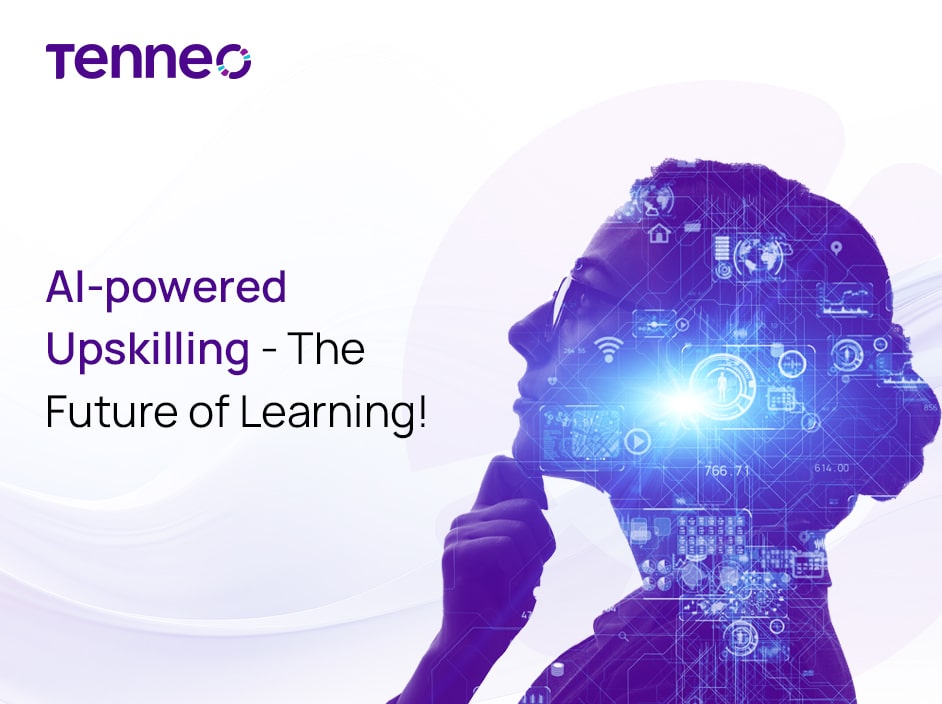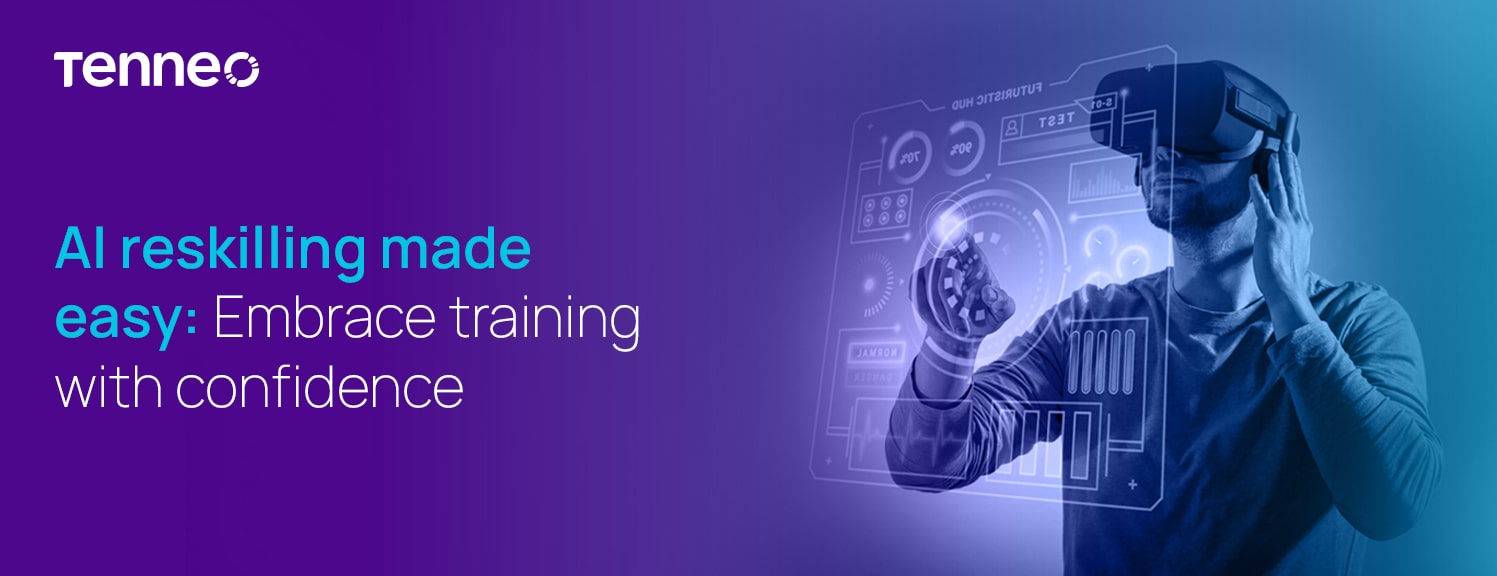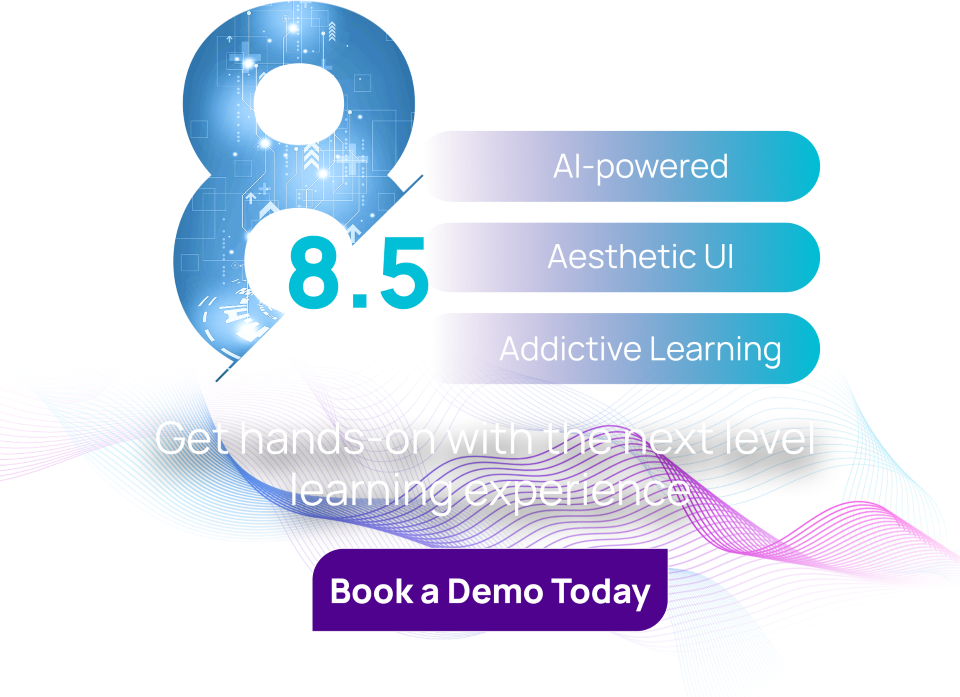
Training Effectiveness Evaluation – How does Tenneo do it?
September 26, 2023
How an AI-Powered LMS can Reshape Employee Upskilling
October 10, 2023
Training Effectiveness Evaluation – How does Tenneo do it?
September 26, 2023
How an AI-Powered LMS can Reshape Employee Upskilling
October 10, 2023Overcome Employee Resistance to AI Reskilling

As organizations increasingly embrace AI-driven solutions, the need to reskill the workforce for AI is paramount. However, this transition is not without its challenges. Many employees harbor concerns about AI reskilling, and it's essential for organizations to address these concerns to ensure a smooth transition. We will explore common employee concerns, with a particular focus on how AI growth affects employees, and provide effective strategies, including the role of a Learning Management System (LMS), to overcome these concerns.
Major Employee Concerns and Roadblocks
- Resistance to Change
Change is often met with resistance, and the introduction of AI is no exception. Employees may fear the unknown, worry about their job roles becoming obsolete, or simply feel uncomfortable with the idea of change. Resistance to change is a natural human reaction, but when it comes to AI, the fear of the unknown can be particularly potent. It's crucial for business leaders to make their employees understand that AI is more of a complementary tool, designed to enhance human capabilities rather than replace them. - Job Security
The fear of job loss in the wake of AI implementation is a significant concern for employees. They might wonder if their skills will become redundant or if their positions will be automated, potentially leaving them without job security. Here, it's essential to emphasize that while AI may change job roles, it also creates new opportunities for employees to upskill and adapt. - Loss of Familiarity
AI and new technologies can be intimidating, especially for those who are not tech-savvy. Employees may feel overwhelmed by the prospect of learning new tools and systems. Providing user-friendly, accessible training can help alleviate this concern, making the learning curve smoother and more manageable. - Fear of Increased Workload
Many employees are concerned that AI will increase their workload rather than making their jobs easier. They may fear they'll be expected to handle both their regular tasks and new AI-related responsibilities. Highlight the importance of proper workload management and provide just-in-time training to help employees efficiently integrate AI into their daily routines. - Conventional Thought Process
Different generations have varying perspectives on technology and change. Gen Z and millennials may be more open to embracing AI, while older generations might resist it due to a lack of familiarity. Tailor your LMS-based training to cater to diverse learning preferences and make it adaptable for employees of all learning styles and needs.
Strategies to Address These Concerns
- Transparent Communication
Open and honest communication is key to addressing employee concerns. Organizations should proactively communicate their AI adoption plans, detailing how it will benefit both the company and its employees. Addressing concerns and offering clear explanations can help alleviate fears.
Use an LMS as a central platform to disseminate information about AI adoption plans, benefits, and how it will impact employees' roles. Interactive features within the LMS, such as forums or chats, can facilitate two-way communication and address employee queries. - Training and Reskilling
AI can help you accelerate employee skill development. Offer comprehensive training programs tailored to employees' needs to adapt to AI. These programs should equip them with the skills required to work alongside AI systems effectively. Investing in continuous learning opportunities demonstrates a commitment to employee development.
Intuitive learning platforms can provide a structured and easily accessible repository of AI-related courses, modules, and resources. Employees can learn at their own pace, track their progress, and receive certifications, making the reskilling process more manageable. - Involvement in Decision-Making
Involve employees in the decision-making process regarding AI implementation. Seek their input and ideas to make them feel valued and part of the transition. This participatory approach fosters a sense of ownership and engagement.
You can create a collaborative learning environment through an LMS. This will help you enable employees to share insights, ask questions, and participate in discussions related to AI integration. This fosters a sense of inclusion and ownership in the decision-making process. - Career Pathway and Development
Create clear career pathways that show employees how AI reskilling can lead to career growth and development. Highlight success stories of employees who have embraced AI and advanced in their careers, emphasizing that AI can be a catalyst for professional advancement.
Use an LMS to map out clear career pathways that demonstrate how AI reskilling can lead to career growth and development. Leverage features within the LMS that allow employees to track their skill development and set goals for advancement. - Mentorship and Support
Establish mentorship programs where experienced employees can guide their peers through the AI reskilling process. Providing a support network can help reduce anxiety and boost confidence among employees.
Choose an LMS that supports mentorship programs where experienced employees can guide their peers through the AI reskilling process. Use the LMS features to facilitate mentor-mentee interactions, share best practices, and provide ongoing support, creating a strong support network.
Conclusion
The learning potential of AI technology is immense. Reskilling the workforce for AI is a crucial step for organizations to stay competitive and innovative in today's business landscape. By addressing common employee concerns, particularly those related to the growth of AI, organizations can successfully navigate this transition. The use of an LMS can significantly enhance the effectiveness of these strategies by providing a centralized platform for communication, training, collaboration, skill tracking, and mentorship. Ultimately, with the right approach and the support of an LMS, organizations and employees can embrace the opportunities that AI reskilling offers and thrive in the age of artificial intelligence.
Tenneo LMS offers features and capabilities to build a conducive learning environment for your workforce. Get in touch with our LearnTech experts to understand how our LMS can help you build a future-ready workforce.

